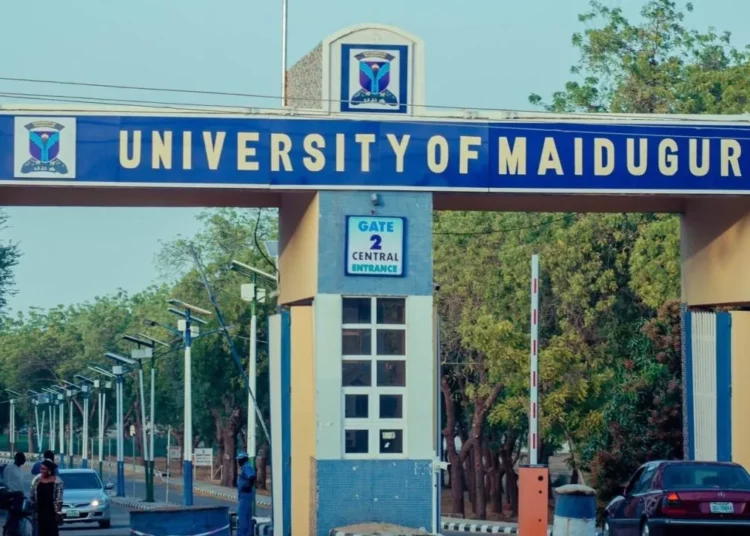In the often emotionally charged world of Nigerian politics, even symbolic gestures become battlegrounds of sentiment and identity. The recent decision by President Bola Tinubu to rename the University of Maiduguri after the late President Muhammadu Buhari has sparked a flurry of reactions—from cautious acceptance to outright resistance.
The backlash, although predictable, once again raises important questions about the place of national honour in a deeply polarised political environment. At stake is not the academic standing of the University of Maiduguri—known widely as UNIMAID—but the meaning and method of preserving legacies in a nation that often forgets too quickly and remembers too selectively.
The late Muhammadu Buhari, who died at the age of 82 on July 13, served Nigeria twice—as a military ruler from 1984 to 1985, and again as a democratically elected president from 2015 to 2023. Whatever one may think of his policies, political leanings, or temperament, few can dispute that Buhari was a central figure in Nigeria’s modern history. He steered the country through difficult terrain and left behind a legacy that, while debated, remains impactful.
The renaming of public institutions to honour past leaders is neither new nor unique to Nigeria. Across the world, universities, airports, roads, and libraries bear the names of men and women whose contributions are deemed historically significant. It is part of the collective effort of nations to keep memory alive, to immortalise sacrifice, vision, or service.
In this light, renaming the University of Maiduguri to Muhammadu Buhari University should not, in itself, be controversial. President Tinubu announced the decision during a special Federal Executive Council meeting held in Buhari’s honour—a gesture in keeping with national tradition. After all, UNIMAID was one of the institutions closest to Buhari’s heart, located in the region where he had the strongest political influence and where he fought insurgency with uncommon commitment during his presidency.
Yet, the reactions have ranged from sceptical to hostile.
Some alumni and faculty have pointed out that the university already honoured Buhari by naming its Senate Building after him, arguing that a second recognition is redundant. Others, including the Borno State chapter of the opposition Peoples Democratic Party (PDP), have suggested that the Federal University of Transportation in Daura—Buhari’s hometown—would have been a more appropriate choice.
The Academic Staff Union of Universities (ASUU), University of Maiduguri chapter, has signalled its disapproval and promised to make its stance known after a full congress meeting. Memories are still fresh of a similar protest that forced former President Goodluck Jonathan to reverse the decision to rename the University of Lagos after Moshood Abiola in 2012.
But we must ask: to what end are these protests? And what exactly is being protected?
University names do not define academic excellence. A name change does not tamper with syllabi, disrupt research, or affect accreditation. If anything, it can enhance visibility and attract interest. Oxford University remains revered not because of its name but because of centuries of rigorous scholarship. So too must Nigerian universities learn to focus on building prestige through academic output, not emotional attachments to nomenclature.
It is also important to point out that many of the objections stem more from politics than from principle. For some, the renaming is seen as a way of canonising a figure they opposed politically. For others, it is a perceived erasure of the institution’s founding identity. But the University of Maiduguri, established in 1975 during the era of the Third National Development Plan, has undergone its own transformations over the decades. Like the country it serves, it must grow, evolve, and adapt to history.
Moreover, the process for renaming a federal university is guided by law. The National Assembly will need to amend the enabling Act that established UNIMAID to give legal effect to this change. That process, which will include public hearings and consultations, offers ample opportunity for voices to be heard in a structured and democratic manner.
We urge the academic community, students, alumni, and political stakeholders to approach this issue with perspective. Honour does not diminish the honoured, nor does it devalue the honouring institution. Muhammadu Buhari’s name—now to be borne by one of Nigeria’s oldest and most strategic universities—is part of our shared history. Whether one agrees or disagrees with his politics, his contributions to Nigeria cannot be wished away.
We also call on the government to ensure that the gesture of renaming is matched by renewed investment in university infrastructure, research, and academic freedom. Let the new Muhammadu Buhari University not be only a tribute in name, but a thriving centre of excellence worthy of the legacy it now carries.
At a time when Nigerian higher education faces daunting challenges—from underfunding to brain drain—symbolism must be accompanied by substance. That is the true honour worthy of any leader’s memory.
This is no time for sterile protests. It is time for a calm national reflection. Let us not mistake sentiment for substance. Let us move forward with the dignity that education, history, and nationhood deserve.





